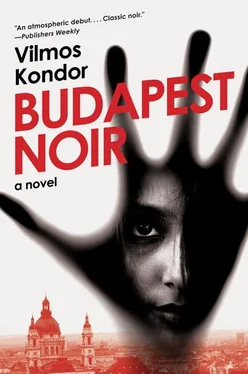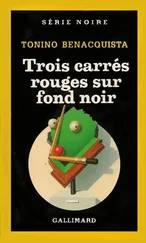“A fine good day to you, sir!” Krisztina called out. “We’re looking for Teréz.”
Albeit softly, the man snarled right back at the dogs, whereupon they turned around and sat in front of the verandah.
“Do come in—they don’t bite.”
Gordon looked at the pulis with suspicion before opening the gate. The stout, walrus-mustached man wiped his hand on his trousers. “You’re looking for Teréz?”
“That’s right,” Krisztina replied with a smile.
“You can look all you want, because she’s not here. She went into Miskolc to arrange her servant’s license.”
“You’re her husband?”
“I’m her big brother. And what do you want from her?”
“We want to talk with her about her former employers,” Gordon replied.
“Fine by me,” said the man with a shrug. “But she’ll only be home in the afternoon. Not worth trying before three.”
“Then we’ll come back around three,” said Gordon, taking Krisztina’s arm and returning to the car.
“What now?” asked Krisztina.
“I don’t know,” replied Gordon with evident annoyance. “We’ll wait till three.”
“Try not to get carried away—I can see how excited you are to escape the city for a bit and see more than three trees at once.”
Gordon gave a dismissive wave of his hand and got in the car. Czövek quickly packed up his breakfast and slipped back behind the wheel. “Where to?”
“Back to the hotel.” All along the way Gordon stared out the window without a word.
Traffic had picked up inside the hotel. One luxury car after another stopped out front or headed off, taking guests to and fro. Gordon told Czövek to return at two-thirty, then asked at the front desk if a typewriter was available that he could borrow.
“Of course, sir,” the clerk replied. “I’ll have it sent up to your room along with paper.”
“Don’t tell me you want to work,” said Krisztina in the elevator.
“Not necessarily,” Gordon replied. “But it wouldn’t hurt for me to type up what I’ve learned so far.”
“And what good would that do?”
“So I see the whole thing on paper. Something in this story is out of place.”
“What?”
“I’ll tell you in the room,” Gordon replied as the elevator stopped on the fourth floor.
In the room Krisztina took from her suitcase her camera, a pair of comfortable shoes, a knit hat, a pair of gloves, and a warmer jacket.
“You knew you’d have time to go for an outing?”
“No, but I figured it couldn’t hurt to pack just in case. Aren’t you coming with me?”
“No,” said Gordon, shaking his head.
There was a knock. Gordon opened the door, took the Remington typewriter from the bellboy, and placed it on the desk by the balcony.
“Before I leave,” said Krisztina, turning toward him, “tell me what it is about the story that doesn’t click.”
Gordon rolled a sheet of paper into the typewriter. “You’ve got this merchant of Jewish stock whose father converted to Christianity and whose Christian daughter falls in love with the son of a Hassidic rabbi. There’s nothing so unusual about this so far, really. Then the girl is found dead at the edge of the red-light district, three months’ pregnant. This is a bit unusual, but not all that much, after all. I’m beaten up by this guy with a crooked nose whose name is Pojva, and rumor has it that he’s a hired thug. It’s not a big leap to suppose he’s probably the one who killed the girl, who, however, seems not to have existed at all, given that not even her own family wants to hear about her. I can see that, too. But not that her father had her killed.”
“Haven’t you heard of this sort of thing?”
“Sure, Krisztina, sure I’ve heard of it. But not even then does everything click. Something’s not in order. I want to type it all down to see if there are any holes in the story. Did something escape my attention?”
“Well then,” said Krisztina, “get to work, put your thoughts in order.” With that, she hung the camera from her shoulder and shut the door behind her. At first, Gordon tried to use his right hand cautiously, but he was surprised to find that it didn’t hurt nearly as much as he’d thought it would. Despite that, he was careful not to overdo it, and by the time Krisztina returned around one, he was using mainly his left hand again.
Krisztina put her camera on the bed as Gordon signaled that he’d be done shortly. On reaching the end of the paragraph, he pulled the sheet of paper from the typewriter and stood up. “Did you see lots of lovely things?” he asked Krisztina.
“Yes,” she replied, “but if we don’t eat right away, I’ll die of hunger, and not even you could want that.” Gordon folded the sheets of paper, slipped them into the inside pocket of his blazer, and they went downstairs to the restaurant.
At lunch, Krisztina’s eyes sparkled with enthusiasm as she recounted her outing. She’d climbed up through the woods to the White Stone Lookout. The mountainside was so steep that the trail was at least five times as long as it would have been had it been straight, on account of all its zigzagging. “Every part of me hurts,” she said with satisfaction. “My legs, my shoulders, my hands.”
“At least you’re happy about it,” Gordon observed. “And did you take pictures?”
“Of course,” said Krisztina with a smile. “Two great big deer plus two fawns, as well as some pheasants.” She went on to describe the woods, the hunter’s lookout towers, the brownish-yellow leaves, and the towering pines.
“So then, did you figure out where the fault is in the story?” she asked after finishing her own account.
“Maybe nowhere,” Gordon replied. “Maybe I simply don’t want to believe what the facts are telling me.”
“You yourself said you can’t argue with facts.”
“That’s right. But I don’t have every fact in my possession yet. Let’s go visit that woman, then.”
The Opel parked in front of the house. On seeing them arrive, the mustachioed man, who was again out in the yard, opened the house door and gave a shout inside. A couple of moments later a plump woman came out. Determining her age was all but impossible. She could just as well have been thirty as fifty. But when she spoke, it was evident from her voice that she was somewhere between the two.
“Do come in,” she said, “come in.” The pulis locked their eyes on Gordon and Krisztina as they walked into the kitchen. Two children around ten years old were sitting at the table. Teréz told them to leave, then pulled two more chairs out for her guests. “Please sit down. We can’t go into the sitting room: my mother is sick.”
“I hope it’s not serious,” said Krisztina.
“Past eighty everything is serious,” replied Teréz.
“We heard you make beautiful embroideries,” said Krisztina, looking at the table, which was draped with a dazzling tablecloth.
“Oh, not really,” said the woman, blushing.
“Show me a few,” said Krisztina. Teréz went into the room as Gordon stood up restlessly and went to the door. Suspiciously he took stock of the country stove, the low ceiling, the carved chairs. A couple of minutes later Teréz reappeared with a small armful of embroidered tablecloths, runners, and pillowcases. She set them down on the table in front of Krisztina, who reached inside her purse and rummaged about for quite a while. Finally, Krisztina looked up at Gordon. “Zsigmond, I’m out of cigarettes. Would you get me a pack?”
“Sure,” he replied, now turning to Teréz. “Say, where can I get cigarettes around here?”
“Oh dear, the closest place is Lillafüred. For proper cigarettes, I mean—the sort you folks smoke. Around here we only have shag tobacco.”
Читать дальше
Конец ознакомительного отрывка
Купить книгу












